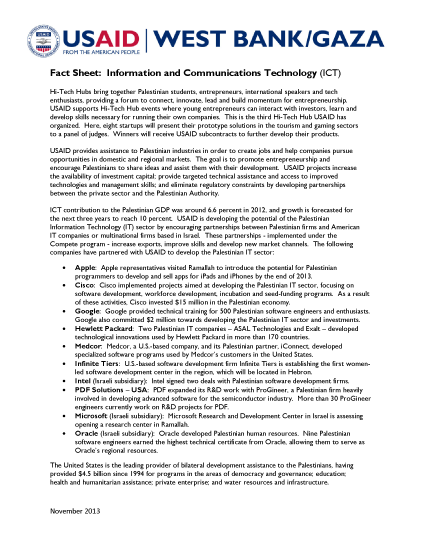Hi-Tech Hubs bring together Palestinian students, entrepreneurs, international speakers and tech enthusiasts, providing a forum to connect, innovate, lead and build momentum for entrepreneurship.
USAID supports Hi-Tech Hub events where young entrepreneurs can interact with investors, learn and develop skills necessary for running their own companies. This is the third Hi-Tech Hub USAID has organized. Here, eight startups will present their prototype solutions in the tourism and gaming sectors to a panel of judges. Winners will receive USAID subcontracts to further develop their products.
USAID provides assistance to Palestinian industries in order to create jobs and help companies pursue opportunities in domestic and regional markets. The goal is to promote entrepreneurship and encourage Palestinians to share ideas and assist them with their development. USAID projects increase the availability of investment capital; provide targeted technical assistance and access to improved technologies and management skills; and eliminate regulatory constraints by developing partnerships between the private sector and the Palestinian Authority.
ICT contribution to the Palestinian GDP was around 6.6 percent in 2012, and growth is forecasted for the next three years to reach 10 percent. USAID is developing the potential of the Palestinian Information Technology (IT) sector by encouraging partnerships between Palestinian firms and American IT companies or multinational firms based in Israel. These partnerships - implemented under the Compete program - increase exports, improve skills and develop new market channels. The following companies have partnered with USAID to develop the Palestinian IT sector:
- Apple: Apple representatives visited Ramallah to introduce the potential for Palestinian programmers to develop and sell apps for iPads and iPhones by the end of 2013.
- Cisco: Cisco implemented projects aimed at developing the Palestinian IT sector, focusing on software development, workforce development, incubation and seed-funding programs. As a result of these activities, Cisco invested $15 million in the Palestinian economy.
- Google: Google provided technical training for 500 Palestinian software engineers and enthusiasts. Google also committed $2 million towards developing the Palestinian IT sector and investments.
- Hewlett Packard: Two Palestinian IT companies – ASAL Technologies and Exalt – developed technological innovations used by Hewlett Packard in more than 170 countries.
- Medcor: Medcor, a U.S.-based company, and its Palestinian partner, iConnect, developed specialized software programs used by Medcor’s customers in the United States.
- Infinite Tiers: U.S.-based software development firm Infinite Tiers is establishing the first womenled software development center in the region, which will be located in Hebron.
- Intel (Israeli subsidiary): Intel signed two deals with Palestinian software development firms.
- PDF Solutions – USA: PDF expanded its R&D work with ProGineer, a Palestinian firm heavily involved in developing advanced software for the semiconductor industry. More than 30 ProGineer engineers currently work on R&D projects for PDF.
- Microsoft (Israeli subsidiary): Microsoft Research and Development Center in Israel is assessing opening a research center in Ramallah.
- Oracle (Israeli subsidiary): Oracle developed Palestinian human resources. Nine Palestinian software engineers earned the highest technical certificate from Oracle, allowing them to serve as Oracle’s regional resources.
The United States is the leading provider of bilateral development assistance to the Palestinians, having provided $4.5 billion since 1994 for programs in the areas of democracy and governance; education; health and humanitarian assistance; private enterprise; and water resources and infrastructure.
November 2013








Comment
Make a general inquiry or suggest an improvement.